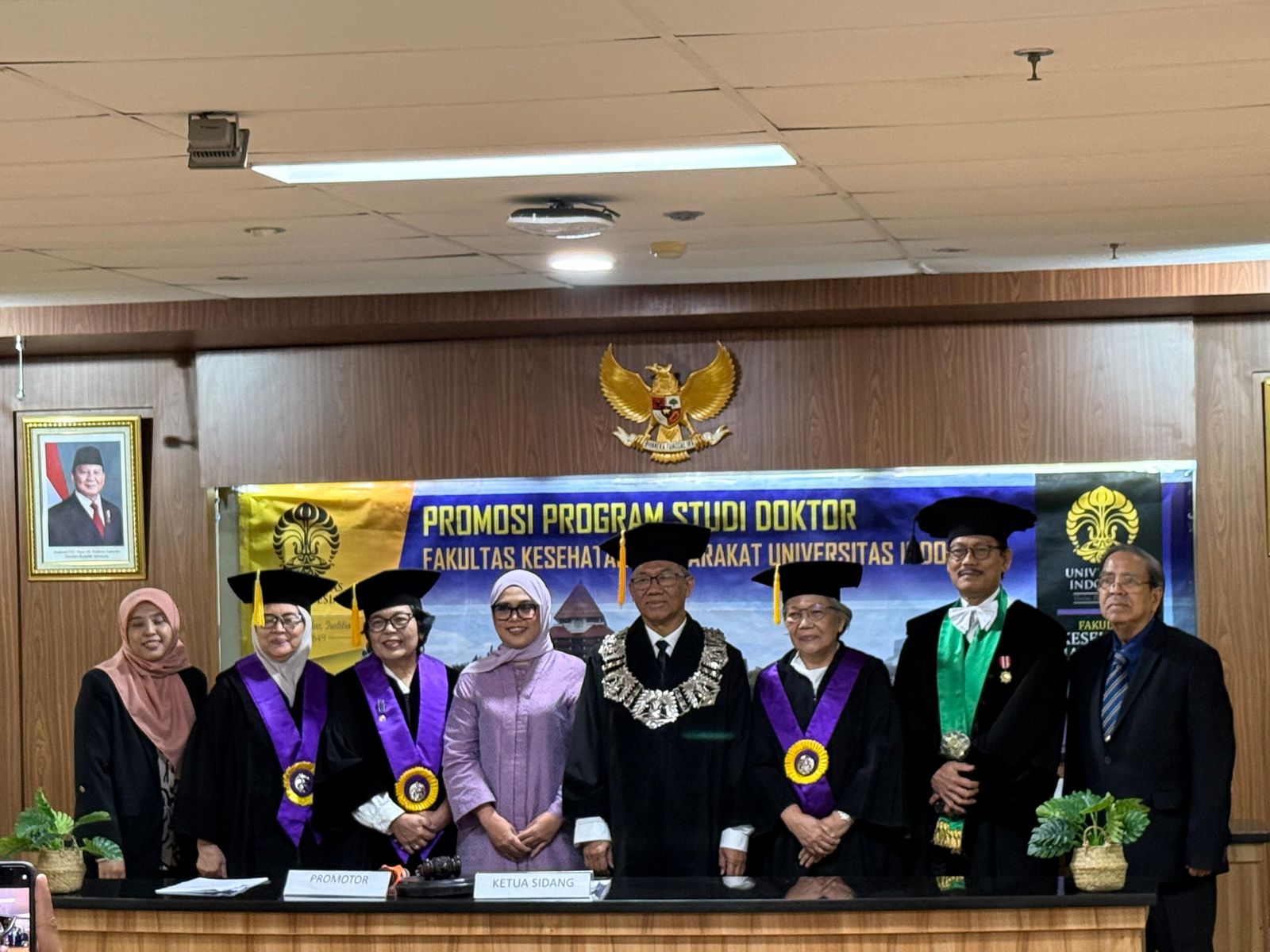Depok, October 27, 2025 — The Doctoral Program in Epidemiology, Faculty of Public Health (FPH), Universitas Indonesia (UI), held an open doctoral promotion session for Lusiani, the doctoral candidate. The session was chaired by Prof. Dr. Mondastri Korib Sudaryo, M.S., D.Sc., with Prof. Drg. Nurhayati Adnan, M.P.H., M.Sc., Sc.D. as Promoter, and Prof. Dr. Drg. Mardiati Nadjib, M.Sc. and Prof. Dr. Dr. Idrus Alwi, Sp.PD, Subsp.KV. as Co-Promoters. The examination board consisted of Prof. Dr. Dr. Sabarinah Prasetyo, M.Sc.; Prof. Dr. Dr. Budi Yuli Setianto, Sp.PD, Subsp.KV, SpJP; Dr. Soewarta Kosen, M.P.H., Dr.PH.; and Trisari Anggondowati, S.K.M., M.Epid., Ph.D. Lusiani successfully defended her dissertation titled “Clinical and Cost Effectiveness of a Multidisciplinary Program for Chronic Heart Failure Patients in Reducing Hospital Readmissions at Cipto Mangunkusumo Hospital.” The session was conducted in hybrid format at the Doctoral Promotion Room, FPH UI.
Heart failure is one of the major causes of mortality, morbidity, and high healthcare costs in hospitals. In Indonesia, the burden of heart failure continues to increase alongside longer life expectancy and the high prevalence of hypertension and diabetes. Heart failure occurs when the heart fails to pump blood effectively throughout the body, leading to symptoms such as shortness of breath, fatigue, and leg swelling. Patients with chronic heart failure are prone to relapse and frequent readmissions, which significantly increase both mortality risk and treatment costs.
Most of the costs associated with heart failure come from repeated hospitalizations, while preventive and rehabilitative interventions remain underutilized. As a national referral hospital, Cipto Mangunkusumo Hospital (RSCM) has developed a Heart Failure Clinic based on a Multidisciplinary Program (MDP) approach. MDP is a comprehensive care model that integrates cardiologists, cardiac surgeons, nurses, pharmacists, nutritionists, and rehabilitation specialists into a coordinated follow-up system. Unlike standard care, which is reactive and episodic, MDP emphasizes proactive monitoring, continuous patient education, and long-term management to prevent early readmissions. Although MDP has been shown to reduce rehospitalization and mortality risks, its clinical and cost effectiveness in Indonesia had not yet been thoroughly evaluated.
Lusiani’s dissertation employed a retrospective cohort design using longitudinal data of chronic heart failure patients at Cipto Mangunkusumo Hospital over eight months. The study assessed both clinical effectiveness and direct medical costs between patients enrolled in the MDP and those receiving standard care. The research subjects were chronic heart failure patients aged over 18 years who received treatment at the RSCM Heart Failure Clinic (IPKT-RSCM) between 2018 and 2023. Data were collected from electronic medical records and hospital billing databases. Clinical effectiveness was measured by the proportion of patients who did not experience hospital readmission within eight months. Univariate and bivariate analyses were conducted to describe patient characteristics and initial comparisons. Logistic regression and ROC curve analyses were used to evaluate program effectiveness and determine mortality prediction thresholds, followed by Generalized Linear Model (GLM) analysis to obtain adjusted risk differences (RD). Cost analysis was performed from the hospital perspective, encompassing all direct medical costs (inpatient, outpatient, medications, laboratory tests, rehabilitation, and procedures). Cost savings were determined by comparing mean total expenditures between groups and tested through one-way sensitivity analysis.
The findings revealed that patients enrolled in the MDP had a significantly lower risk of readmission compared to those receiving standard care, and this effect remained consistent over time. MDP patients also demonstrated longer intervals before the first readmission, indicating a delay in the recurrence of hospitalizations based on survival analysis. From a cost perspective, the MDP group showed lower total medical expenses per patient and per readmission event compared to standard care—resulting in over one-third total cost savings, primarily due to reduced hospitalization duration and fewer intensive procedures. Although outpatient costs were higher, these were offset by substantial reductions in inpatient costs and length of stay, making MDP a more effective and economically dominant strategy.
This research is the first study in Indonesia to simultaneously evaluate both the clinical effectiveness and cost efficiency of the MDP model at the nation’s largest hospital. The use of the MDP analytical framework highlights a shift in healthcare financing—from reactive readmission management to proactive, patient-centered, and continuous care through outpatient follow-up. These findings provide strong scientific support for integrating the MDP model into Indonesia’s National Health Insurance (JKN) system and demonstrate that coordinated, multidisciplinary care can serve as a sustainable solution for future healthcare financing. “It is expected that this model can be replicated in other hospitals within the JKN referral system to enhance healthcare quality nationwide,” stated Lusiani.
Based on her dissertation results, Lusiani was awarded the title of Doctor in Epidemiology with cum laude honors. She became the 132nd Doctoral Graduate in Epidemiology and the 478th Doctoral Graduate at FPH UI. (Promovendus)

